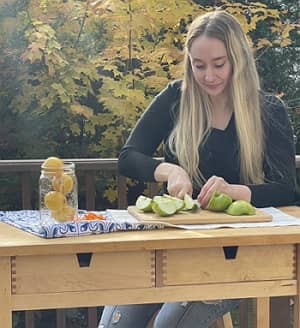Contents
Why We Label By The Season
While I understand the value of organizing recipes by dietary preference or restriction, I choose to take a different approach – one that focuses less on labels and more on how we decide what to eat and cook.
To think about food in terms of the time of year. Eating in sync with nature not only changes the way we cook but also how we connect with the world around us.
Yes, many of us live in places where we can get almost any food at any time, thanks to global supply chains. But is that always what’s best for us, and for the planet? That’s where seasonal eating comes in.
The Health Benefits of Seasonal Eating
When we eat seasonally, we naturally bring more variety into our diets. Over the course of a year, you’re exposed to different fruits and vegetables, which helps ensure you “eat the rainbow.” This diversity isn’t just fun – it’s essential. A varied diet supports gut health, which plays a role in everything from digestion to immune strength, weight balance, blood sugar control, and heart health.
Local, seasonal food can also be more nourishing food. Many small farms avoid pesticides, which have been linked to harmful health effects over time. Supporting these growers means fewer chemicals on your plate and less damage to the soil, air, and water that sustain us all.
How to Eat by the Season
Here are some simple strategies for aligning your plate with the calendar:
- Shop locally: Farmers’ markets, CSAs, and farm boxes often reflect what’s truly in season.
- Notice patterns: Strawberries in June, root veggies in January – your local produce aisle tells the story of the season.
- Cook in bulk: When produce is abundant, buy extra to freeze, pickle, or ferment for later.
- Rotate your meals: Challenge yourself to try one new seasonal item each week.
- Lean on herbs and spices: They can help you adapt seasonal foods into meals you already love.

Produce to Look Out for By the Season
🌸 Spring
- Asparagus: An excellent source of folate and antioxidants, asparagus also supports a healthy digestive system.
- Spinach: A beloved leafy green and a well-known plant source of iron.
- Strawberries: A springtime favorite packed with vitamin C to support skin health and boost the immune system.
- Peas: A versatile veggie that can double as a complex carbohydrate, offering both fiber and plant-based protein.
☀️ Summer
- Tomatoes: Rich in essential nutrients (most notably lycopene) which supports heart health.
- Zucchini: A vibrant summer staple that’s hydrating, fiber-rich, and easy to add to any meal.
- Blueberries: Toss a handful onto yogurt or breakfast bowls for a powerful boost of antioxidants that help protect brain health.
- Bell Peppers: No matter the color, they deliver a hearty dose of vitamin C to support immunity and collagen production.
🍂 Fall
- Pumpkin: Fall’s most iconic produce is also an incredible source of beta-carotene for eye and skin health.
- Apples: A classic fall fruit and a great source of soluble fiber to support gut health.
- Brussels Sprouts: A holiday table staple that provides vitamin K and a variety of antioxidants.
- Sweet Potatoes: A nutrient-dense starchy vegetable loaded with fiber for digestion and vitamin A for healthy vision.
❄️ Winter
- Citrus (oranges, grapefruits, lemons): These bright winter fruits add color to the season while supplying plenty of vitamin C to support immunity.
- Kale: A hardy winter green rich in calcium and vitamin K to support bone health.
- Cabbage: Easy to prepare, satisfying, and full of fiber and natural detox-supporting compounds.
- Pomegranates: Their jewel-like seeds add flavor and antioxidants to salads and entrées, along with heart-healthy polyphenols.
A Day of Seasonal Eating
Here are sample Breakfast, Lunch, Dinner, and Snack ideas for each season:
🌸 Spring
- Breakfast: Spinach and asparagus frittata with fresh herbs
- Lunch: Pea and mint soup with crusty sourdough
- Snack: Strawberries with yogurt or coconut cream
- Dinner: Roasted radishes, salmon, and quinoa
☀️ Summer
- Breakfast: Overnight oats in soy milk with blueberries and chia seeds
- Lunch: Tomato mozzarella salad with fresh basil
- Snack: Corn on the cob with a sprinkle of chili and lime
- Dinner: Grilled chicken with roasted peppers and a cucumber salad
🍂 Fall
- Breakfast: Pumpkin oatmeal with walnuts and cinnamon
- Lunch: Grilled chicken, apple and brussels sprout slaw with tahini dressing
- Snack: Sweet potato wedges with hummus
- Dinner: Turkey burger with cranberries and wild rice
❄️ Winter
- Breakfast: Citrus and kale smoothie with greek yogurt
- Lunch: Salmon and beets, goat cheese salad with toasted walnuts
- Snack: Pomegranate seeds with dark chocolate
- Dinner: Braised cabbage with lentils, roasted carrots, and ground meat
Key Takeaways
- Food is more than labels.
- Seasonal eating boosts health.
- Local and seasonal foods can be more nourishing.
- It’s easier than you think. Shopping locally, observing seasonal patterns, rotating meals, and preserving surplus produce can help you align your plate with nature.
- Seasonal produce is abundant and nutrient-rich.
- Seasonal eating inspires creativity.
To learn more about what Dining With Nature offers for nutrition care – hit the Explore The DWN Programs button below or take a look at our Services page.
Disclaimer: The information in this post is for general educational purposes only and should not be considered personalized medical advice or a substitute for professional guidance. Always consult with your doctor or a registered dietitian before making any changes to your diet, lifestyle, or supplement routine.

